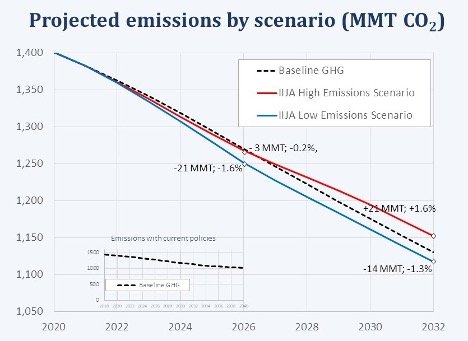Will federal transportation funds be a blessing or curse for Georgia?
On January 26, eight members of Georgia’s congressional delegation sent a letter to Georgia’s State Transportation Board requesting information regarding the Georgia Department of Transportation’s (GDOT) use of federal transportation funds for transit projects. This letter comes on the heels of the federal Infrastructure Investment and Jobs Act, which will dramatically increase transportation funding by approximately 20 percent over coming years. Given transportation’s outsized role in Georgia’s greenhouse gas emissions and the state’s historic underinvestment in public transit, the question of how this money will be used is an important one. This money could help Georgia build a more climate-friendly transportation system, or it could spur even more pollution.

Modeling performed by the Georgetown Climate Center shows that these new transportation funds could be a blessing or a curse. If used wisely — for projects like road maintenance, safety improvements, and transit expansion — it could reduce total transportation emissions by 1.3 percent. But if used to further expand our road network and encourage additional driving, the new money could drive up emissions by 1.6 percent. The decisions on how these funds will be used will largely be made by state and local government agencies like GDOT.
Federal transportation funding often can be used for different purposes and, as explained in the congressional delegation letter, some categories of funds can be used for both road and transit projects. But GDOT has rarely utilized this flexibility and instead spends its federal funds almost exclusively on road projects. As a result, transit projects in Georgia have received little state funding.
A key step to reduce the contribution of vehicle emissions to the climate crisis is to expand our transit network, and building these new projects will require using federal funds differently than Georgia has in the past.
The congressional delegation letter notes that GDOT has taken a similarly inflexible approach to state gasoline tax revenues. GDOT has not used these state funds for transit projects, citing a provision in the state constitution requiring that gas tax revenue be used for “activities incident to providing and maintaining an adequate system of public roads and bridges.” The Bus Rapid Transit system proposed throughout metro Atlanta would operate on the same roads and bridges that GDOT has historically funded with state gas tax revenues, yet the agency does not plan to help pay for these transit projects with these revenues.
Addressing the climate crisis requires a different approach to transportation, including a different approach to our use of transportation funds. At both the federal and the state levels, transportation funds that can be used for transit expansion must be prioritized for that purpose. Funds that cannot be used for transit should be focused on road maintenance and safety. Having entrusted GDOT with an influx of additional transportation funds, it is incumbent on the agency to use them wisely.
